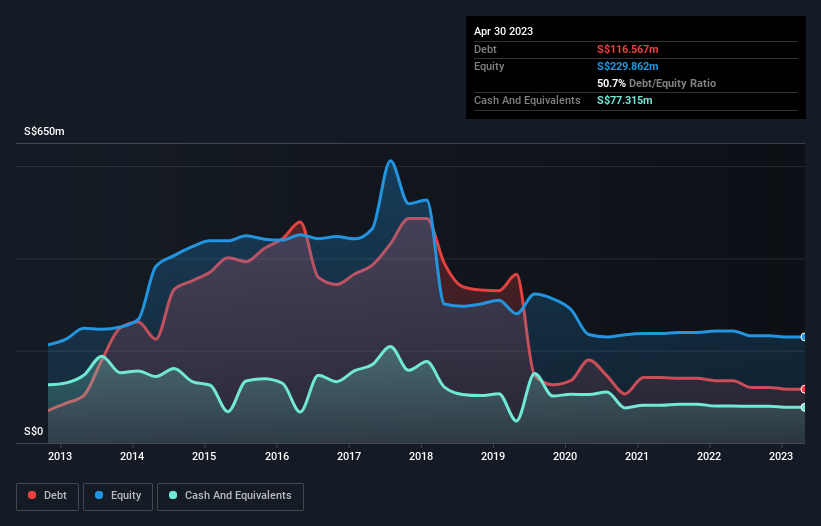Some say volatility, rather than debt, is the best way to think about risk as an investor, but Warren Buffett famously said that 'Volatility is far from synonymous with risk.' So it might be obvious that you need to consider debt, when you think about how risky any given stock is, because too much debt can sink a company. As with many other companies Vibrant Group Limited (SGX:BIP) makes use of debt. But should shareholders be worried about its use of debt?
When Is Debt Dangerous?
Debt assists a business until the business has trouble paying it off, either with new capital or with free cash flow. Part and parcel of capitalism is the process of 'creative destruction' where failed businesses are mercilessly liquidated by their bankers. However, a more common (but still painful) scenario is that it has to raise new equity capital at a low price, thus permanently diluting shareholders. Having said that, the most common situation is where a company manages its debt reasonably well - and to its own advantage. When we think about a company's use of debt, we first look at cash and debt together.
Check out our latest analysis for Vibrant Group
What Is Vibrant Group's Net Debt?
The image below, which you can click on for greater detail, shows that Vibrant Group had debt of S$116.6m at the end of April 2023, a reduction from S$135.1m over a year. However, it also had S$77.3m in cash, and so its net debt is S$39.3m.

A Look At Vibrant Group's Liabilities
We can see from the most recent balance sheet that Vibrant Group had liabilities of S$108.1m falling due within a year, and liabilities of S$168.5m due beyond that. Offsetting these obligations, it had cash of S$77.3m as well as receivables valued at S$48.4m due within 12 months. So its liabilities outweigh the sum of its cash and (near-term) receivables by S$150.9m.
This deficit casts a shadow over the S$46.1m company, like a colossus towering over mere mortals. So we definitely think shareholders need to watch this one closely. After all, Vibrant Group would likely require a major re-capitalisation if it had to pay its creditors today.
We measure a company's debt load relative to its earnings power by looking at its net debt divided by its earnings before interest, tax, depreciation, and amortization (EBITDA) and by calculating how easily its earnings before interest and tax (EBIT) cover its interest expense (interest cover). This way, we consider both the absolute quantum of the debt, as well as the interest rates paid on it.
Vibrant Group has a very low debt to EBITDA ratio of 1.4 so it is strange to see weak interest coverage, with last year's EBIT being only 2.5 times the interest expense. So one way or the other, it's clear the debt levels are not trivial. We saw Vibrant Group grow its EBIT by 8.5% in the last twelve months. That's far from incredible but it is a good thing, when it comes to paying off debt. There's no doubt that we learn most about debt from the balance sheet. But you can't view debt in total isolation; since Vibrant Group will need earnings to service that debt. So if you're keen to discover more about its earnings, it might be worth checking out this graph of its long term earnings trend.
Finally, a company can only pay off debt with cold hard cash, not accounting profits. So we clearly need to look at whether that EBIT is leading to corresponding free cash flow. Over the last three years, Vibrant Group actually produced more free cash flow than EBIT. There's nothing better than incoming cash when it comes to staying in your lenders' good graces.
Our View
Vibrant Group's level of total liabilities and interest cover definitely weigh on it, in our esteem. But its conversion of EBIT to free cash flow tells a very different story, and suggests some resilience. When we consider all the factors discussed, it seems to us that Vibrant Group is taking some risks with its use of debt. So while that leverage does boost returns on equity, we wouldn't really want to see it increase from here. There's no doubt that we learn most about debt from the balance sheet. However, not all investment risk resides within the balance sheet - far from it. For example, we've discovered 3 warning signs for Vibrant Group that you should be aware of before investing here.
If you're interested in investing in businesses that can grow profits without the burden of debt, then check out this free list of growing businesses that have net cash on the balance sheet.
New: Manage All Your Stock Portfolios in One Place
We've created the ultimate portfolio companion for stock investors, and it's free.
• Connect an unlimited number of Portfolios and see your total in one currency
• Be alerted to new Warning Signs or Risks via email or mobile
• Track the Fair Value of your stocks
Have feedback on this article? Concerned about the content? Get in touch with us directly. Alternatively, email editorial-team (at) simplywallst.com.
This article by Simply Wall St is general in nature. We provide commentary based on historical data and analyst forecasts only using an unbiased methodology and our articles are not intended to be financial advice. It does not constitute a recommendation to buy or sell any stock, and does not take account of your objectives, or your financial situation. We aim to bring you long-term focused analysis driven by fundamental data. Note that our analysis may not factor in the latest price-sensitive company announcements or qualitative material. Simply Wall St has no position in any stocks mentioned.
About SGX:BIP
Vibrant Group
An investment holding company, engages in the integrated logistics business in Singapore, Malaysia, China, Rest of Asia, the United States, Oceania, Europe, the Middle East, and internationally.
Flawless balance sheet with solid track record.
Similar Companies
Market Insights
Community Narratives



